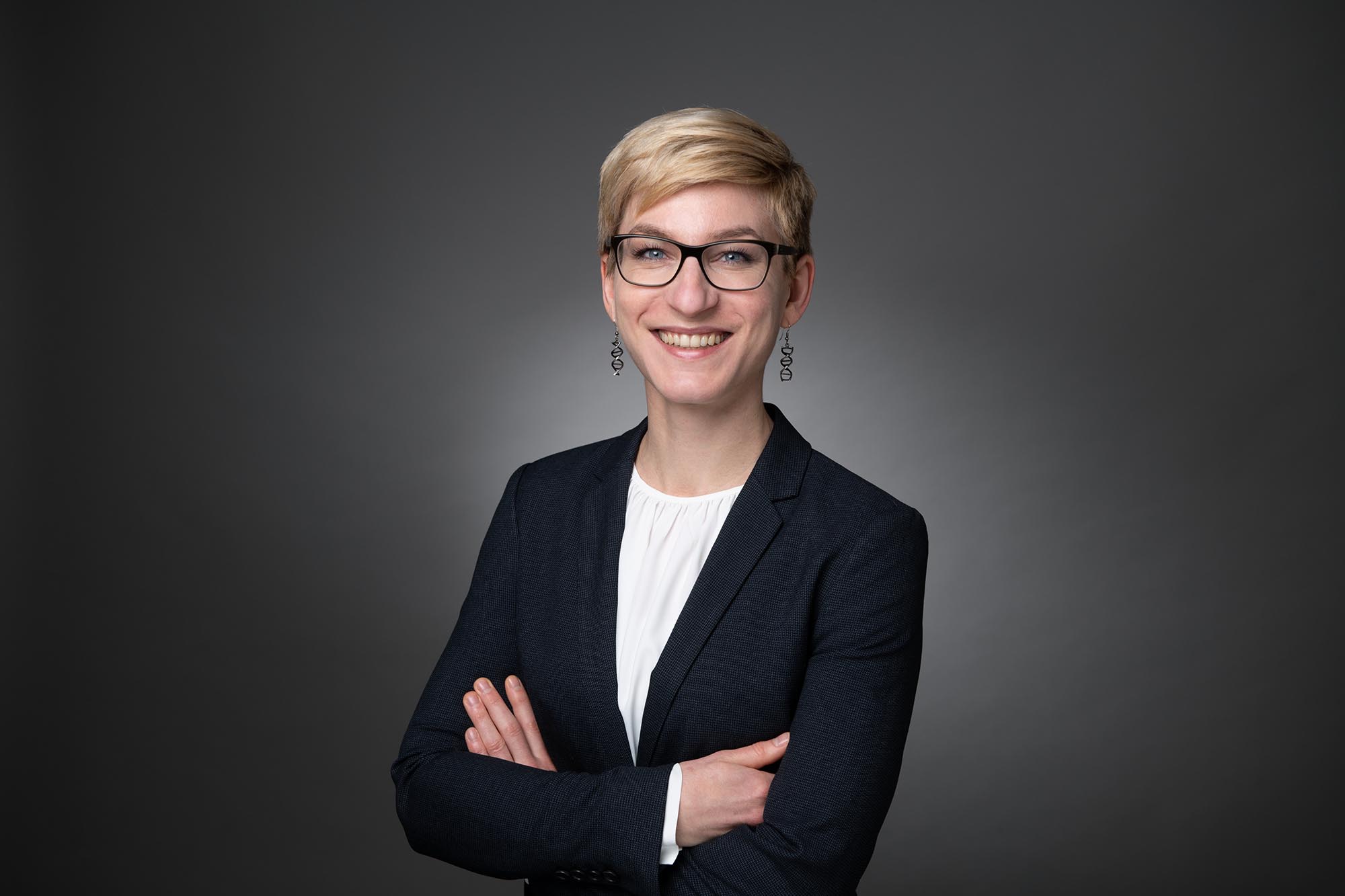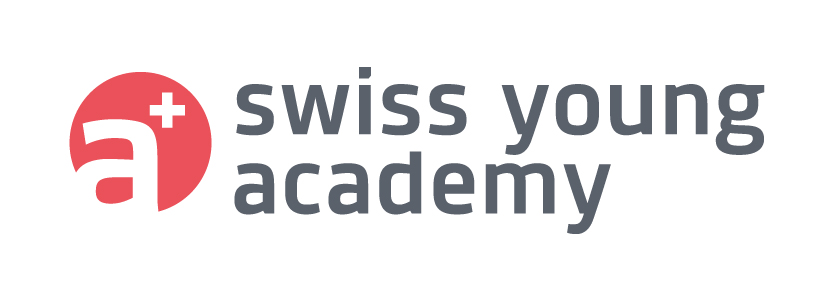Networking science.
An advocate for fairness in academia
Interview | Lisa Stalder

Fanny Georgi, let’s start by dispelling some of the common stereotypes about researchers. Or can you think of something that actually is typical for natural scientists?
That’s an interesting question to start off with! I can certainly dispel the stereotypes that a researcher’s hair is always standing on end, that there’s always something smoking and bubbling away in a laboratory, and that we aren’t interested in anything outside of our specific fields. And in my generation, there are about the same number of female as male undergraduate, graduate, and doctoral students – in life science, women are in the majority. But I must admit that I did actually develop a bit of a quirk from my work with pathogens: I avoid touching the support poles on buses and door handles on trains with my hands. And that’s not just because the microbiologist in me starts thinking about all the different bacteria and viruses that could be on them. It’s also because, after working for so many years in a biosafety lab, it has become second nature to me to avoid contaminating anything with my gloves. Luckily I’ve also become very adept at opening doors with my elbows (laughs).
You wrote your doctoral thesis at UZH on the search for new compounds to treat viral infections. Due to COVID-19, you had to defend your thesis at home on your laptop.
Yes, that was a real shame. And somehow a bit ironic, too. For my PhD thesis, I researched new compounds for the treatment of infections with a certain family of viruses. And I actually found something interesting: a compound that had already been approved but is no longer being used to treat the human immunodeficiency virus (HIV) is suitable for inhibiting the spread of infections with certain types of the adenovirus. The next step would have been to generate clinical data so we could then start the process of obtaining approval or a patent. But it never got that far because a large portion of research funding was, understandably, invested in research on SARS-CoV-2 during the pandemic. That made it much more difficult to obtain funding for research on other topics.
During the pandemic, it sometimes seemed like half of the population consisted of virologists. Was that difficult for you?
There certainly were some challenging moments. From the start of the pandemic, people would often ask for my opinion. That gave me the opportunity to explain my perspective of the situation. And it also allowed me to explain how science works and that life science in particular cannot provide absolute answers. We can only show what we have observed under very specific conditions. In the future, another person could find out that, under varied conditions, our observations no longer apply. Trying to explain that to the general public, which tends to accept news reports as the final word, was very challenging.
“My family says I was always a very inquisitive child, and I am fortunate that my parents encouraged my curiosity.”
Let's take a big step back in time. Long before the pandemic, you decided to study molecular biotechnology. Was there a specific experience that sparked that decision?
Yes, there was. My family says I was always a very inquisitive child, and I am fortunate that my parents encouraged my curiosity. For my eighth birthday, I was given my first microscope, which I used to examine everything I could get my hands on. Later, I even cultivated slipper animalcules so I could observe them under the microscope. I also regularly attended public science lectures at the Deutsches Hygiene-Museum in Dresden. When I was 13, my mother took me along to a lecture given by Nobel Prize laureate Christiane Nüsslein-Volhard. And even though I hardly understood a word, I was completely fascinated. At the end of her lecture, Christiane Nüsslein-Volhard said that whoever hadn’t yet started their studies should study biotechnology. From that moment on, I was determined that’s what I would do.
Since then, you’ve become the Head of Faculty and Professorial Affairs at the Office of the Dean of the Faculty of Science at UZH. Why did you turn your back on research?
I’d like to make it clear that it was never a matter of deciding against something. Even back when I was in school, I was passionate about advocating for others. At school I was the class and school representative, and later at UZH I was the co-president of the Association of Junior Researchers. One issue that is extremely important to me is improving the fairness and sustainability – and thus the impact – of the academic community. I can be more engaged in this issue in my current position than if I were trying to pursue it while working full-time in a research job that was not secure. So when a friend sent me the job announcement for my current position, I knew it was the perfect fit for me. Since taking this job at the Faculty of Science, I’ve been responsible for faculty affairs, committee work, regulations, professorial appointments, and everything related to professorships.
“Especially given the current challenges, we simply cannot afford to lose out on great minds because of gender or skin colour.”
You also feel strongly about the issues of equal opportunity and diversity and are therefore a member of the Gender Equality Commission at UZH.
When competing in academia, having the best idea should be what matters, not having the right face. Especially given the current challenges, we simply cannot afford to lose out on great minds because of gender or skin colour. And even though 54% of the students at the Faculty of Science are women, this percentage decreases along the academic career ladder beyond a PhD. The Gender Equality Commission and the office coordinating it are tasked with identifying the hurdles female academics face and finding ways to remove them.
What concrete measures does UZH take to remove these hurdles?
When it comes to evaluating applicants, the Faculty of Science looks beyond the impact factors of the applicants’ publications to consider the actual impact those individuals are having on their specific fields. We also normalise applicants’ academic ages in order to compare them more fairly. For instance, we take into consideration both time spent on care duties and in part-time positions, irrespective of an applicant’s gender. And we consistently make an effort to avoid what’s called the “solo status” for applicants from under-represented social groups. For example, if there’s only one woman in a pool of applicants, she will quickly be reduced to THE woman among the applicants, and then we tend to fall back into our biased ways of thinking. As soon as a second woman joins the pool, the situation becomes more conducive to an in-depth analysis of the candidates. We have found that the most effective approach is to actively invite suitable people to submit their applications. These are some of the measures that the Faculty of Science has put in place and that I would like to continue to build upon. And yet, I would like to emphasise that institutions of higher education cannot remove all hurdles, for example those existing within the legal framework. Educational institutions are not responsible for the fact that the parent who does not give birth to a child hardly receives any parental leave or that the tax system favours a single earner model.
Your involvement in these issues is not limited to your work at UZH. You also belong to the first generation of young academics who established the Swiss Young Academy. What motivated you to become involved?
When we started up the Swiss Young Academy three years ago, nobody knew exactly what direction it would take. I thought it was a fascinating and exciting opportunity, but also one that came with tremendous responsibility. I was aware that we, as the first generation, would have to get off to a convincing start in order to ensure that the SYA would actually have a future. This was – and still is – a big motivator for me.
“The worst thing academia can do is to stand still.”
When you look back at those first three years, what have you and your colleagues in the SYA achieved?
It would be a bit presumptuous for us to expect to have already made our mark after such a short time. But in fact, we have succeeded in promoting constructive dialogue and making the voice of young academics heard. For example, in 2021 we organised a series of three events that brought together people from politics, academia, and funding organisations. And we will continue along this path, because we are convinced that the first step towards a good solution is always dialogue.
And where else is the Swiss Young Academy’s work heading?
I hope that the Swiss Young Academy will become a permanent feature within Switzerland’s academic landscape and that, as the voice of young academics, we can be closely involved in the relevant processes. I see us taking the role of the motor that drives progress forward – because the worst thing academia can do is to stand still. And I am confident that we will do our part to make sure this doesn’t happen. This is not just because of all our great members but also because of all the dedicated people who work in the Administrative Office and form the organisational backbone of the Swiss Young Academy. They keep us on track and keep us together (laughs).
Biography
Fanny Georgi was born in 1989 in Dresden, then part of the former German Democratic Republic. After spending a year abroad in New Zealand, Georgi studied molecular biotechnology in Heidelberg. Having earned her master’s degree, she pursued her PhD at the University of Zurich. Since then, she has become the Head of Faculty and Professorial Affairs at the Office of the Dean of the Faculty of Science at UZH. Georgi notes that it wasn’t completely by chance she moved to Switzerland given her love of mountains, chocolate, and cheese. In her free time, the 34-year-old can often be found at higher altitudes – hiking, climbing, and exploring the mountains on her touring skis (“but nothing too crazy”) before camping overnight in a tent. Because being outdoors and “very unsterile” is the opposite of working in the lab and at her desk, it provides “the perfect balance” for her. Fanny Georgi has been a member of the Swiss Young Academy since it was established in 2020.
